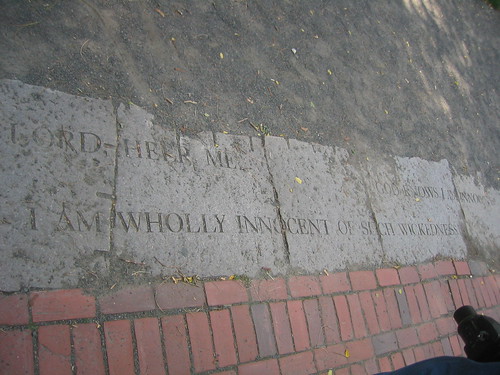Check out the new search from OCLC…Worldcat gets Googlized, and the results are pretty good. I absolutely adore the “refine your search” options that it gives you on the left bar…Now can we finally get rid of our local catalogs? Pretty Please?
Author: griffey
Jason Griffey is the Executive Director of the Open Science Hardware Foundation. Prior to joining OSHF, he was the Director of Strategic Initiatives at NISO, where he worked to identify new areas of the information ecosystem where standards expertise was useful and needed. Prior to joining NISO in 2019, Jason ran his own technology consulting company for libraries, has been both an Affiliate at metaLAB and a Fellow and Affiliate at the Berkman Klein Center for Internet & Society at Harvard University, and was an academic librarian in roles ranging from reference and instruction to Head of Library IT and a tenured professor at the University of TN at Chattanooga.
Jason has written extensively on technology and libraries, including multiple books and a series of full-periodical issues on technology topics, most recently a chapter in Library 2035 - Imagining the Next Generation of Libraries by Rowman & Littlefield. His latest full-length work Standards - Essential Knowledge, co-authored with Jeffery Pomerantz, was published by MIT Press in March 2025.
He has spoken internationally on topics such as artificial intelligence & machine learning, the future of technology and libraries, decentralization and the Blockchain, privacy, copyright, and intellectual property. A full list of his publications and presentations can be found on his CV.
He is one of eight winners of the Knight Foundation News Challenge for Libraries for the Measure the Future project (http://measurethefuture.net), an open hardware project designed to provide actionable use metrics for library spaces. He is also the creator and director of The LibraryBox Project (http://librarybox.us), an open source portable digital file distribution system.
BookMooch
Hey all you book-borrowers? There’s a new toy in town, and it’s called BookMooch.
Think: Netflix for the book set. You pay shipping, and trade books with people around the world, with BookMooch as the connector.
Bonus points for all the librarians out there: how many of their talking points below sound like Ranganathan? Is this an example of a distributed library? Is the phrase “distributed library” even meaningful? I suggested almost a year ago that LibraryThing institute something like this…and while yes, I understand that paper isn’t going anywhere…boy, can you imagine a system like this for digital books.
BookMooch is a community for exchanging used books.
BookMooch lets you give away books you no longer need in exchange for books you really want.
- Give & receive: Every time you give someone a book, you earn a point and can get any book you want from anyone else at BookMooch. Once you’ve read a book, you can keep it forever or put it back into BookMooch for someone else, as you wish.
- No cost: there is no cost to join or use this web site: your only cost is mailing your books to others.
- Points for entering books: you receive a tenth-of-a-point for every book you type into our system, and one point each time you give a book away. In order to keep receiving books, you need to give away at least one book for every two you receive.
- Help charities: you can also give your points to charities we work with, such as children’s hospitals (so a sick kid can get a free book delivered to their bed), Library fund, African literacy, or to us to thank us for running this web site
. - World wide: BookMooch is not just for Americans. You can request books from other countries, in other languages. You receive 2 points when you send a book out of your country, to help compensate you for the greater mailing cost. John Buckman, who runs BookMooch, lives both in California and London, England, and was frustrated by the vast number of books that were printed in just one country but not any another, or only after several years. Translations into French, German and other languages are planned, and we already work fine with the various Amazon worldwide databases.
- Wishlist: you can keep a “book wish list” that will automatically arrive to you when you have the points and/or the book becomes available in our catalog. Others earn 2 points if they supply a book on your wishlist, so everyone is highly motivated to help find books others are looking for.
- All books: our goal is to make more use out of all books, to help keep books from becoming unavailable. The worst thing that can happen to a book is for no-one to be able to read it.
- Feedback score: each time you receive a book, you can leave feedback with the sender, just like how eBay does it. If you keep your feedback score up, people are most likely to help you out when you ask for a book.
- How we pay our bills: We tap into Amazon’s book database, and if you follow an Amazon link from our web site, we receive a commission from Amazon if you buy that book instead of getting it free from BookMooch.
Reservoir Dogs: The Game
I’m pretty certain there’s no way in hell that the actual game can compare to these brilliant commercials:
“Then one day she meets a John Holmes motherfucker…”
If anyone reading this blog would do me a huge favor and throw a linkback or comment or mention on your blog my way…we’re trying desperately to find a great candidate for our recently vacated Head of Systems position here at UTC. The entire job ad is here, and here’s a brief description. If anyone has specific questions, I’ll try and answer them within the best of my legal ability (the state of TN has some wacky rules about job ads)….
Reporting to the Dean of the Lupton Library, this position provides leadership and know-how to advance the Library through the development and expansion of library collections, tools and services that facilitate learning, teaching, and scholarship within a digital environment, as well as creating an infrastructure that facilitates the adoption of next generation library services.
Specific information technology related responsibilities include, but are not limited to:
- Provides library leadership and strategic planning for the design, integration, and maintenance of the library-computing environment and for the specification, acquisition, development, and support of digital library collections, tools, services, and support applications that facilitate teaching, learning, and research.
- Manages a staff of 2 professionals who develop, deliver, and maintain information technology services for the Lupton Library and works collaboratively with other librarians and colleagues throughout the Library and the University.
- Administers the Library’s VTLS Virtua integrated library system.
- Provides consultation, support and problem resolution to ensure Library software and hardware is functional, interoperable, and serves the ongoing goal of supporting research and teaching.
- Gathers, monitors, and evaluates usage statistics.
- Serves as backup to other members of the Library’s Information Technology Services Department.
- Ensures the Library’s Information Technology Services Department is positioned to take advantage of new developments that improve the patron experience and staff productivity.
- Serves as primary Library liaison to University’s Information Technology Division.
This is a great environment to work in…the team that is in the library now is remarkable. We’re moving towards a very robust systems/IT infrastructure, and have some really great ideas where we’d like to go. Plus, you’d get to work with me! 🙂
So if anyone knows someone looking, please make sure they apply! As well, throw a link to this entry up anywhere you can, or link directly to the job ad above.
Library 2.0 Generator
Really funny stuff from Dave Pattern: the Library 2.0 Idea Generator!
Librarians go Bowling
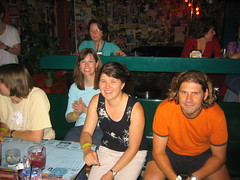 |
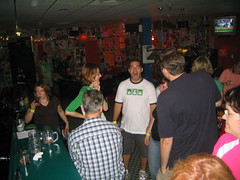 |
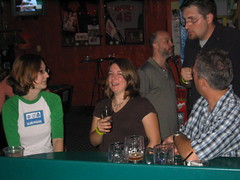 |
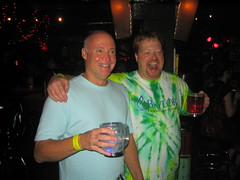 |
Last night we finally got a bit of a break from the insane pace of Immersion when most of us took the opportunity to head to Milky Way Bowling and try our hand at a little candlepin bowling. Free drinks, free food, and a bit of physical activity, and we were almost ready for today.
Today = re-writing our pre-Immersion assignment with all the tools and tricks we’ve learned over the last 3 days. What was a 4 page document is probably going to be 10 or more by the time I’m done with the damn thing, and working thru all the new concepts and strategies is almost overwhelming. It’s going to take months to digest all the stuff we’ve done.
The best part of the experience? By far it’s meeting people like those in the pics above…I’ve learned a lot in 4 days, but I think I’ll be learning from these guys for the rest of my career.
Learning Styles
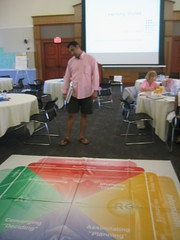 A great deal of today was spent trying to wrap our heads around Kolb’s Learning Styles inventory, developing lessons that incorporated as many of the styles as possible, and examining our own preferences in instructional design with Kolb as a lense. Rewarding, but difficult stuff to work through.
A great deal of today was spent trying to wrap our heads around Kolb’s Learning Styles inventory, developing lessons that incorporated as many of the styles as possible, and examining our own preferences in instructional design with Kolb as a lense. Rewarding, but difficult stuff to work through.
We also had the pleasure of having Randy discuss our primary instructional tool: ourselves. We looked at voice, body, and attitude as it relates to the instructional arena. Again, incredibly rewarding stuff, and things that definitely aren’t taught during the MLS. I’m learning about 2-3 things every day that will directly influence my instruction at UTC…which, I suppose, is the point, after all.
Tonight = mock instruction, with the real thing tomorrow.
The day before we began Immersion, I was able to do a tour of Boston that had been arrange by ACRL. We saw a ton of Boston, including the Old North Church and Boston Commons. We also drove over the Salem and saw the House of Seven Gables and the cemetary where the Salem Witches are buried…the picture is of the memorial to these innocents who were killed by a fanatical populace.
My Immersion photos are here, and more photos are being added by other participants using the acrlimmersion2006 tag.
Today was day one of Immersion, and there’s far more than I can possible write. Plus, I should be doing my homework. So I’m off to that. More Immersion talk tomorrow.
Headin’ to Boston
This morning I head out for ACRL Immersion, at Simmons College in Boston, MA. The next week will be a whirlwind of instruction, along with trying to keep up with the ongoing website redesign and, you know, breathe.
I’m going to do what I can to blog some of the action. The schedule is absolutely insane…7:30 am – 9 or 10pm every night. So what time I have may be reserved for sleeping, but I’ll do my best. 🙂
BarCampRDU
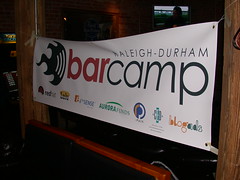
Yet another reason that I miss the Triangle…incredibly fun things like BarCampRDU. It looks like Fred and Paul and the gang did an incredible job with this, and I’m sad to have missed it. Next year, guys?
Oh, and do you have any of those rockin’ tshirts left over in XL? 🙂

